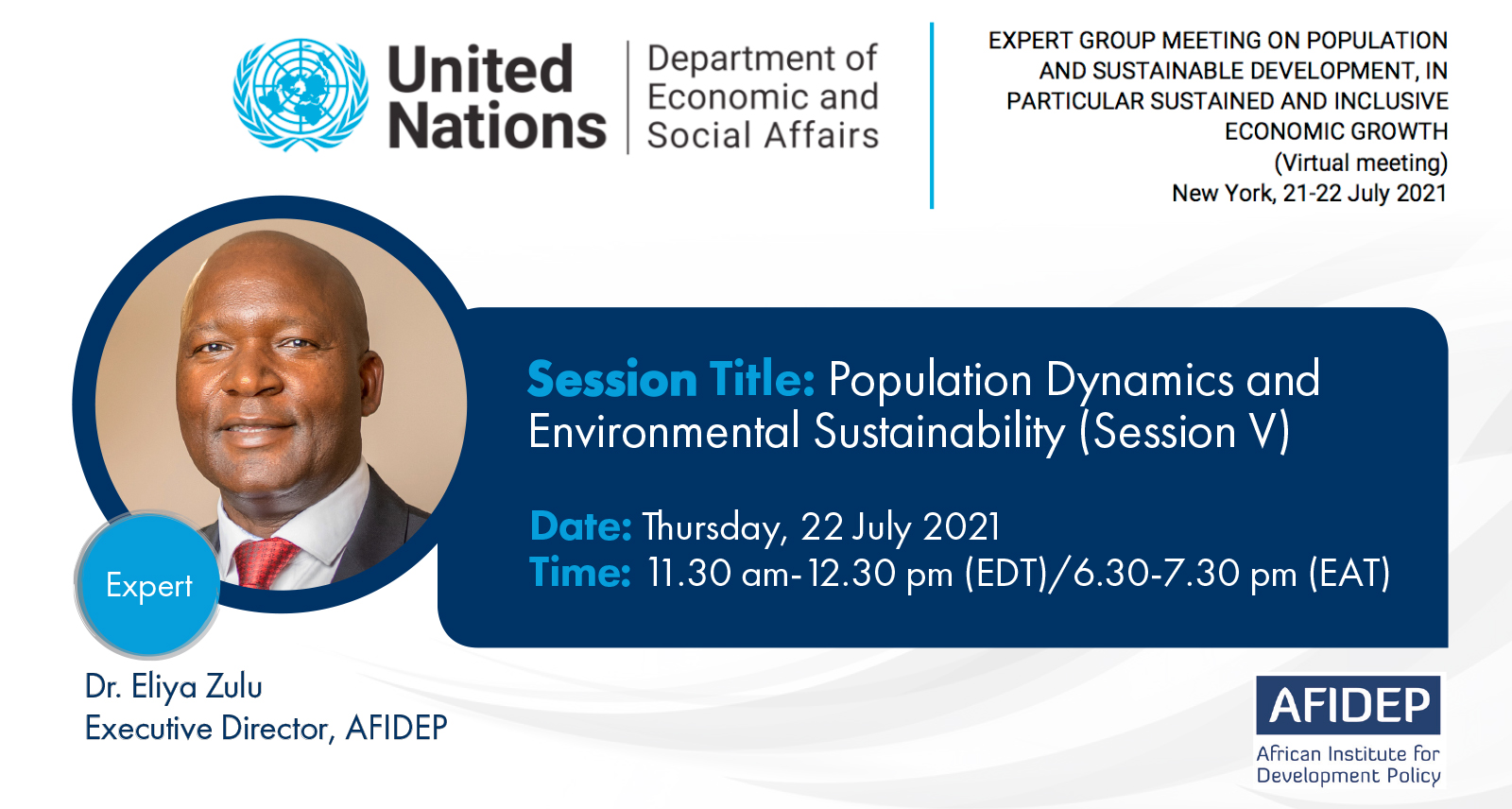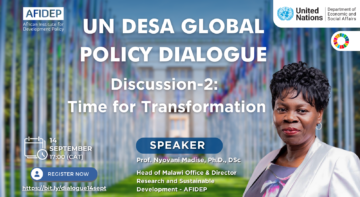News

AFIDEP’s Executive Director, Dr Eliya Zulu will join experts at a high-level meeting convened by the United Nations (UN) Population Division of the Department for Economic and Social Affairs (DESA). Happening on 21 and 22 July 2021, the meeting will discuss ‘population and sustainable development, in particular sustained and inclusive economic growth’ which is the special theme of the 55th session of the UN Commission on Population and Development (CPD).
Dr Zulu will be joined by other experts, Leiwen Jiang, Senior Associate – Population Council and Raya Muttarak, Program Director – International Institute for Applied Systems Analysis (IIASA) on Thursday 22 July (11.30am – 12.30pm, EDT) in session five (V) of the meeting to share insights on ‘population dynamics and environmental sustainability.’
The session will be moderated by Steven Stone, Chief, Resources and Markets Branch, Economy Division – UNEP. Specifically, the session will explore population dynamics and global climate challenges; how population change has affected the patterns of consumption and production; and the key environmental implications.
Currently, AFIDEP is leading work on a new global USAID initiative to promote a cross-sectoral approach to challenges at the nexus between population, the environment, and development.
The ongoing global health crisis and economic downturn caused by the COVID-19 pandemic have renewed attention on among other things, population dynamics, sustainable economic growth and forms of inequality. The expert group meeting will bring together high-level speakers, experts and moderators to review the latest evidence and analysis on these topics. Presentations and discussions from the meeting are expected to generate inputs for the preparation of the Secretary- General’s report on the forementioned theme of CPD’s 55th session, scheduled for 2022.
The theme is related to chapter III of the Programme of Action adopted by the International Conference on Population and Development (ICPD) in Cairo, Egypt on September 1994. The chapter highlights the integration of population in development strategies, and the interlinkages between population, sustained economic growth and poverty on one hand, and on the other, between population and the environment.
These issues are not only relevant today but have gained new importance and urgency with more research and evidence now available demonstrating the linkage between population dynamics and economic growth. Additionally, there has also been an accumulation of evidence on environmental problems attributable to unsustainable patterns of production and consumption since the Cairo conference.
The mandate of CPD, as reaffirmed in 2016, is to monitor, review and assess the implementation of the Programme of Action of the ICPD. Within that mandate, CPD also contributes to the follow-up and review of the 2030 Agenda for Sustainable Development, taking into account the integrated nature of the Sustainable Development Goals (SDGs) and their interlinkages.
During the expert meeting, key topics to be deliberated include:
- Trends in the interrelations between population dynamics, macroeconomic growth, poverty and inequalities, including recent evidence about the impacts of the COVID-19 pandemic. New era of low interest rates and implications for global income and wealth inequality.
- The role of the intergenerational economy in enabling demographic dividends and in financing social programs against the background of demographic shifts.
- The “gendered economy” and accounting of the full economic contributions of women (within and outside of the household), and their connections to gender equality and the empowerment of women. Issues pertaining to the economy of care and its potential role in the new green economy.
- Health sector and labour market issues related to the extension of lifespans and healthy ageing, including flexible work and retirement arrangements, role of labour migration, etc.
- Policy challenges and financing, including for the labour market and social protection, faced by countries transitioning toward advanced stages of population ageing, including those experiencing, or expected to see soon, population decline.
- Interlinkages between population, sustainable consumption and production, the environment and climate change.
- National and regional experiences in the integration of population issues in development planning and strategies.
- Suggestions of other ways in which the Secretary-General’s report could effectively support the Commission’s mandate to review and assess the implementation of the ICPD Programme of Action and its contribution to achieving the SDGs.
UN DESA convenes the expert group meeting in collaboration with the Division for Economic Analysis and Policy (EAPD) and for Inclusive Social Development (DISD), the United Nations Population Fund (UNFPA) and the UN Conference on Trade and Development (UNCTAD).
To learn more, kindly visit: https://www.un.org/development/desa/pd/events/EGM-CPD55
Download Dr Eliya Zulu’s presentation below.
The Population, Environment and Development (PED) Approach to tackling Climate Change in Africa





